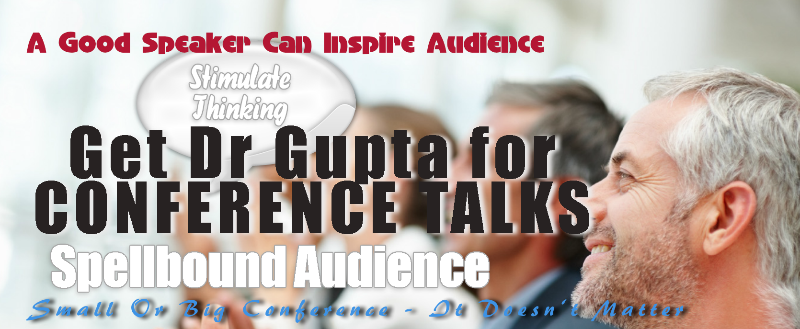WELCOME TO RG CONFERENCE TALKS
Dr Rajeev Gupta knows that the first seven minutes are crucial, and he makes the biggest impact right at the onset so that the audience want to hear more from him. He knows that each person in his audience is an important person and their time is valuable. He, therefore, works to deliver them a presentation that is designed for them, and to leave them pleased that they spent that 10 or 50 minutes of their valuable time listening to him.
Although he has a professional background, he has spoken in hundreds of conferences and meetings which are pitched for the general public as well as business, professional, political and social organisations. He thinks carefully about his audience - who are they, and what can he assume about what they already know about the topic of the talk?
Dr Gupta is sometimes asked to address the wider audience with varied interest, and he manages to put a context to connect and provide them with a tangible interest. He provides the people in the audience with information that they require in order to understand the topic through stories and engage them to have a discussion. He cares to engage the audience and cares if they understand the theme or not.
For a scientific conference, he clearly targets his talks to the audience that is familiar with the scientific process if not the topic, as sometimes the subspecialty of the audience may be entirely different.
He is really a good speaker and he effectively manages to communicate something to everybody in the room, no matter who they are or how much they already know. To the relatively uninformed, he at least tends to convey: what is the purpose of the conference or meeting and why is it important. At the same time, to the well-informed, he conveys how the topic, session or panel discussion can add or broaden the thinking.
Book Now
DR Rajeev Gupta uses narrative and stories in the talk and says it is impossible to overemphasize the importance of narrative in a talk. He tells a story in which he is the principal character. His stories are fun. With his amusing stories, he hooks the audience and they willingly follow him even into dark corners of an unknown topic.
Through his functional, stories he can engage people in the audience who may be struggling to follow the topic.
Dr Gupta says that - it amazes me that people prepare talks without ever asking themselves this question, but they appear to. A lot of people spend too much time describing their research methods -- what they did, and what their data look like. It's easy to understand why people make that mistake: what you did is, after all, what you spent most of your time doing. But the whole point of your research effort was to learn something that you could then communicate to others. There's no need to force your audience to endure the same tedium. You can save your audience all that work by telling them what it was you learned.
